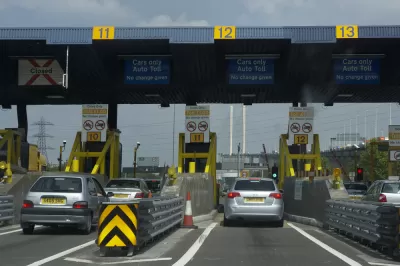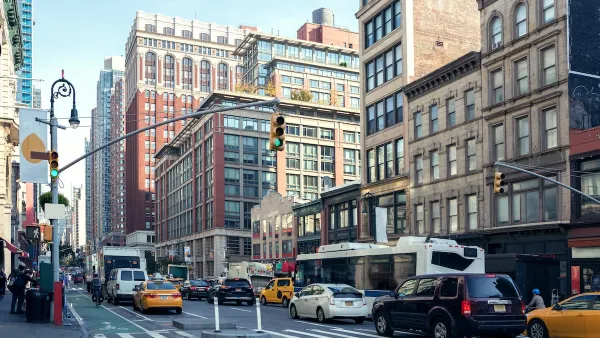A timely debate, as New York City debates a congestion pricing scheme proposed by Gov. Andrew Cuomo, and California looks for ways to reduce emissions from transportation.

Michael Manville tackles the big, politically challenging problem of congestion pricing. Of particular concern is the typical congestion pricing opposition argument of its impact on populations living in poverty.
Before debating the question of whether tolls are fair, Manville explains congestion pricing and also cites examples of the success of congestion pricing schemes in London, Stockholm, Milan, and Singapore. If you're looking for a clear, concise explanation of the concepts behind congestion pricing, the beginning of Manville's article is a good place to start.
Then, Manville turns to the polemic, and the question of congestion pricing's fairness to people dealing with poverty.
…Tolls would be regressive — their burden is larger for lower-income people. On the other hand, not all low-income people drive. The poorest people generally can’t afford cars, so tolls would not hurt the most vulnerable — and might even help them (if reduced traffic congestion let buses travel faster).
That said, many low-income people do drive, and tolls may burden them. Fortunately, tolls also come with a built-in solution to this problem: revenue. Toll revenue can offset costs for low-income drivers…
More compelling arguments to refute the idea that congestion pricing can't be fair, and also that the status quo is fair at all, conclude the article. For the real world situations where large population centers are considering measures to mitigate congestion and its negative environmental and economic outcomes, see the debate over Governor Andrew Cuomo's congestion pricing proposal for New York City, and a discussion of California's elephant in the room of climate change: emissions from cars.
FULL STORY: Is congestion pricing fair to the poor?

Montreal Mall to Become 6,000 Housing Units
Place Versailles will be transformed into a mixed-use complex over the next 25 years.

Planetizen Federal Action Tracker
A weekly monitor of how Trump’s orders and actions are impacting planners and planning in America.

DARTSpace Platform Streamlines Dallas TOD Application Process
The Dallas transit agency hopes a shorter permitting timeline will boost transit-oriented development around rail stations.

Study: 4% of Truckers Lack a Valid Commercial License
Over 56% of inspected trucks had other violations.

Chicago Judge Orders Thousands of Accessible Ped Signals
Only 3% of the city's crossing signals are currently accessible to blind pedestrians.

Philadelphia Swaps Car Lanes for Bikeways in Unanimous Vote
The project will transform one of the handful of streets responsible for 80% of the city’s major crashes.
Urban Design for Planners 1: Software Tools
This six-course series explores essential urban design concepts using open source software and equips planners with the tools they need to participate fully in the urban design process.
Planning for Universal Design
Learn the tools for implementing Universal Design in planning regulations.
City of Mt Shasta
City of Camden Redevelopment Agency
City of Astoria
Transportation Research & Education Center (TREC) at Portland State University
US High Speed Rail Association
City of Camden Redevelopment Agency
Municipality of Princeton (NJ)





























